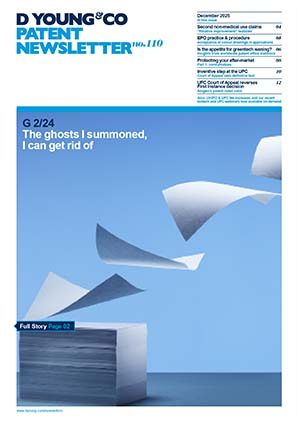G 1/22 & G 2/22: EPO significantly softens stance on formal entitlement to priority
This consolidated decision of the European Patent Office (EPO) Enlarged Board of Appeal represents a significant softening of the EPO’s historical stance on assessing formal entitlement to priority.
Moreover, while the question of the validity of the Patent Cooperation Treaty (PCT) joint applicants approach was left open, such situations were held to benefit from an implied agreement absent substantial indications to the contrary that should lead to the same outcome in most cases.
Background
The EPO has historically taken a strict approach when assessing formal entitlement to claim priority, particularly regarding the identity between the applicant(s) of an application and the applicant(s) or their successor(s) in title of an earlier filing from which priority is claimed.
While acknowledging the term “any person” recited by Article 4A(1) of the Paris Convention for the Protection of Industrial Property (mirrored in Article 87(1) of the European Patent Convention) to be ambiguous, EPO Boards of Appeal have consistently held that all applicants named on a priority application, or their successors in title, must be named on the subsequent application claiming priority. Moreover, Boards of Appeal have consistently held that any transfer of the priority right must be effected before the filing date of the priority-claiming application.
Given this strict stance, it has been suggested that third parties in EPO opposition procedures have increasingly sought to attack formal priority entitlement, with the aim to knock out a patent in view of novelty-destroying intervening disclosures. Where entitlement has been challenged, it has generally been up to the proprietor to demonstrate that there was a valid transfer of the priority right before the filing date of the later application.
A high-profile example is T 0844/18, an appeal against the revocation of one of the Broad Institute’s key CRISPR-Cas9 patents (EP 2771468 B). EP 2771468 B claimed priority from multiple earlier applications, the first two of which named an applicant-inventor not named on the subsequent priority-claiming PCT application. The Board of Appeal held that there was no evidence of a transfer of the rights of said applicant-inventor before the filing date of the subsequent application. Consequently, the patent was not entitled to priority and was revoked in view of novelty-destroying intervening disclosures.
EPO Boards of Appeal have generally held that national law should be used to assess any alleged transfer of the priority right. This has led to complex proceedings wherein Boards of Appeal have had to establish which national law should be determinative (see, for example, T 1201/14), hear extensive expert evidence regarding the applicable provisions under said national law, and then apply said provisions. In cases such as T 0844/18 it has been questioned whether the EPO is competent at all to assess a party’s entitlement to claim priority.
Against this backdrop, the PCT joint applicants approach has been applied by some Boards of Appeal to situations where a US priority application is filed in the name of the inventors, and a subsequent PCT application claiming priority to the earlier US application names the inventors as applicants for the US designation only. Some Boards of Appeal have held that this is sufficient to allow a co-applicant different from the inventors named by the priority application to rely on the priority right in Europe. However, the legal basis for this approach has been questioned.
The referral
The referral was a joint decision from the appeals T 1513/17 and T 2719/19. In each case, the validity of the PCT joint applicants approach had been contested. Moreover, the parties and referring Board of Appeal agreed that the broader question of the EPO’s competence to assess entitlement to priority should also be addressed.
The first question addressed by the Enlarged Board of Appeal was: “Is the EPO competent to assess whether a party is entitled to claim priority under Article 87(1) EPC?”. The second question did not refer to the PCT joint applicants approach by name, but essentially asked whether the specific corresponding circumstances could give rise to a valid claim to priority in Europe.
The first question
The Enlarged Board of Appeal answered in the affirmative to the first question. The justification given was similar to previous Technical Board of Appeal decisions, for example, legal certainty and the need for the EPO as a patent-granting institution to be able to determine the state of the art.
However, the Enlarged Board of Appeal went further and added that “There is a rebuttable presumption under the autonomous law of the European Patent Convention (EPC) that the applicant claiming priority in accordance with Article 88(1) EPC and the corresponding Implementing Regulations is entitled to claim priority.” Said rebuttable presumption was held to apply broadly, for example, where the European patent application derives from a PCT application, and/or where the priority applicant(s) are not identical with the subsequent applicant(s).
The consequences of this “rebuttable presumption” are significant and appear to be a marked departure from historical practice. Formal requirements for the transfer of the right to priority are essentially swept away, as the “autonomous law” of the EPC contains no such provisions. Moreover, the burden of proof has shifted to the party challenging the priority entitlement.
In its reasoning, the Enlarged Board of Appeal took the position that “the EPC should not establish higher formal requirements than those established under national laws that may be relevant in the context of a European application.” Indeed, the Enlarged Board of Appeal went further and stated: “To the contrary, the EPO should adapt itself to the lowest standards established under national laws and accept informal or tacit transfers of priority rights under almost any circumstances.”
Even more strikingly, the Enlarged Board of Appeal commented that “Even the requirement that the transfer of the right to priority needs to be concluded before the filing of the subsequent European patent application is questionable in the Enlarged Board’s view.” Consequently, it appears that it might even be possible to “fix” a missing transfer by retroactive (“nunc pro tunc”) assignment.
The second question
The Enlarged Board of Appeal avoided addressing the validity of the “PCT joint applicants approach” as such, finding its applicability “questionable”. However, the Enlarged Board of Appeal held that in the applicable circumstances there was an “implicit agreement” (absent indications to the contrary) between the named parties conferring the right to benefit from priority in Europe. A decision on the PCT joint applicants approach was therefore said not to be needed because the concept of an implied agreement “should allow an assessment leading to the same result as the PCT joint applicants approach in most cases.”
Notably, this “implicit agreement” does not apply where not all co-applicants are named in the subsequent application (as was the case in T 0844/18). However, the “rebuttable assumption” would still apply.
What of third parties?
The Enlarged Board of Appeal decision will undoubtedly be welcomed by applicants and proprietors who will now benefit from the “rebuttable presumption”. The Enlarged Board of Appeal held that the rebuttable presumption will generally be a “strong presumption” and that a party challenging entitlement must demonstrate “specific facts” that “support serious doubts”. It is hard to imagine many scenarios in which a third party could now successfully challenge formal priority entitlement, given that evidence relating to an alleged transfer will generally be within the control of the proprietor and not in the public domain.
Consequently, formal priority attacks in EPO oppositions may become confined to the “rare exceptional cases” cited by the Enlarged Board of Appeal in its reasoning, namely “bad faith behaviour on the side of the subsequent applicant or to the outcome of other proceedings such as litigation before national courts about the title to the subsequent application.”
This curtailment of third parties was acknowledged by the Enlarged Board of Appeal. In justification, it noted that the originating purpose of the priority right was as a convenience to patent applicants, and referenced comments made in Accord v RCT [2017] EWHC 2711 (Ch) that there was “no obvious public interest in striking down patents on this ground, unlike all the other grounds of invalidity”. The Enlarged Board of Appeal also noted that national courts were not bound by the EPO’s assessments.
In short
This decision appears to be a significant softening of historical EPO practice that will be welcomed by applicants and proprietors, but is likely to see successful formal challenges to priority entitlement become a rarity in opposition.
It will also be interesting to see how Boards of Appeal apply the decision to cases where arguments and evidence have already been provided and indeed decided upon at first instance under the former regime.
Case details at a glance
Jurisdiction: European Union
Decision level: EPO Board of Appeal
Parties: Alexion Pharmaceuticals, Inc v Novartis AG, F Hoffmann-La Roche AG & Chugai Pharmaceutical Co Ltd
Citation: G 0001/22
Date: 10 October 2023
Case details at a glance
Jurisdiction: England & Wales
Decision level: High Court
Parties: Accord Healthcare Limited v Research Corporation Technologies Inc
Citation: [2017] EWHC 2711 (Pat)
Date: 07 November 2017

